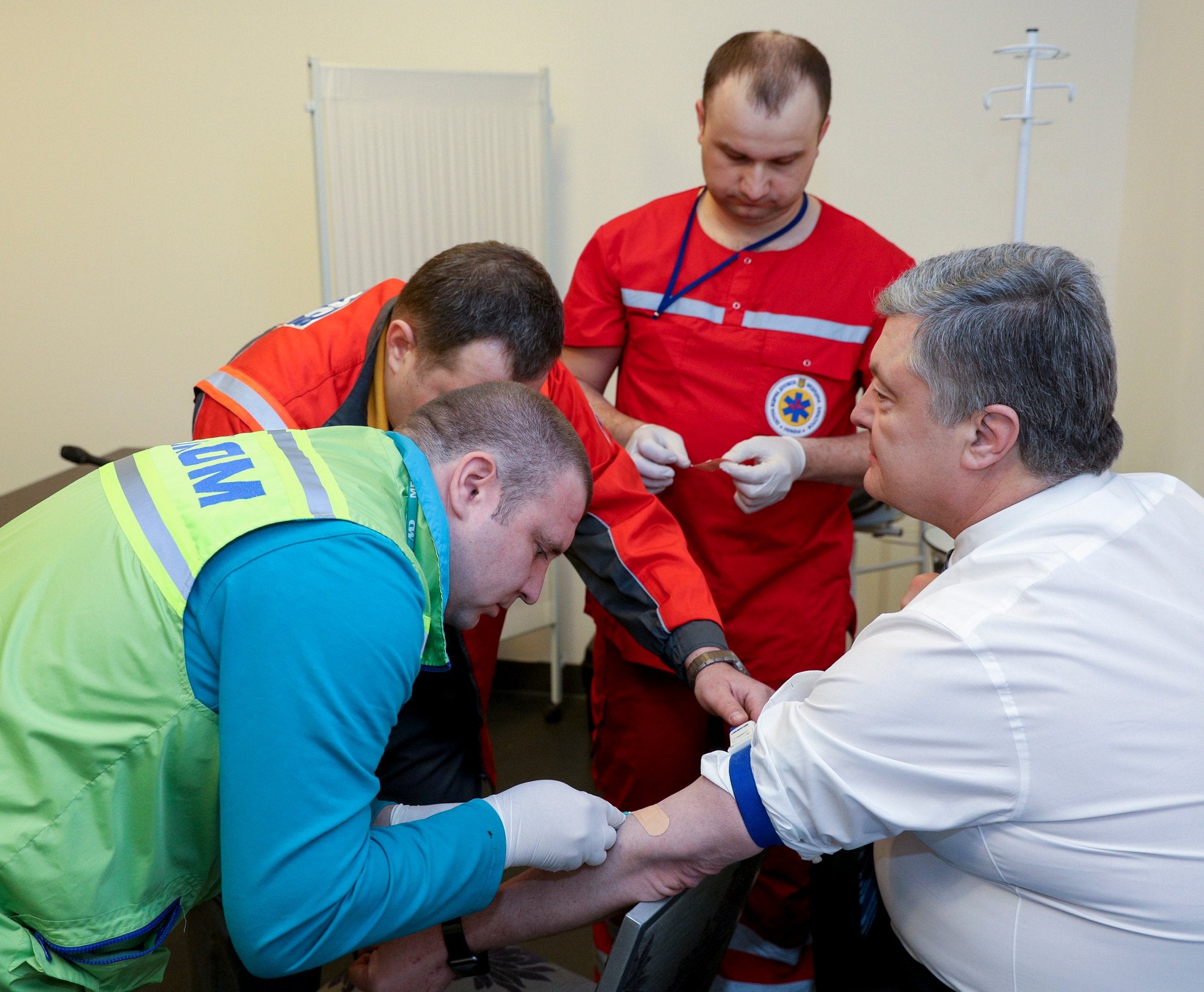Ukraine elections: As comedian Zelensky takes the lead, it’s no longer a joke in Russia either
Russia has been glued to Ukrainian elections with wall-to-wall coverage on state TV. So far, most of the coverage has been of ridicule, but Mr Zelensky’s unexpectedly strong numbers are changing the calculations, writes Oliver Carroll
There have been many low points in Petro Poroshenko’s painful re-election campaign, but it’s highly unlikely he ever imagined being reduced to doing a public drugs test and participating in a “stadium debate” with a comedian candidate better known for genital humour.
But those were the cheeky demands made by Volodymyr Zelensky, Poroshenko’s second-round opponent and the unexpected presidential favourite. It wasn’t even Zelensky’s most surreal offering. The very next day, the comedian suggested the losing third-place candidate Yulia Tymoshenko should host the debate.
All things considered, Poroshenko’s acquiescence to blood and urine analysis seemed almost statesmanlike.
Looking in from Moscow – and many were – it was time to take the presidential piss.
Olga Skabeyeva, the combative host of Russia’s prime-time propaganda talk show 60 minutes, quipped that Zelensky had made “a major error” in his ultimatum. She should be the one hosting the debate, and, what’s more, she’d do it for free.
“Who is this Yulia Tymoshenko anyway?” she said.
Skabayeva’s tongue-in-cheek intervention continued the Russian state media’s largely condescending take on Ukraine’s presidential election.
Most of the coverage, which was more substantial than that of Russia’s own election last year, has zoomed in on the absurdities of the Ukrainian vote. Of these, of course, there have been plenty: the field of 39, mostly fake candidates; the ex-minister using the elections to search for a wife; and the real prospect of a comedian becoming president.
But it is increasingly perilous territory for the Kremlin. With Ukraine now set on a very public display of democracy – where an incumbent president will voluntarily take part in a free debate against a young, quick-witted and popular challenger – the jokes could well begin to wear thin. The very name of Vladimir Putin’s most prominent challenger, Alexei Navalny, is banned from the Russian airwaves.
The democratic mismatch between Russia and Ukraine was highlighted on Friday when Kremlin spokesman Dmitry Peskov was asked if the Kremlin would ever agree to a televised presidential debate.

That depended, he answered: “If a candidate who enjoys the overwhelming support of his people is put up against a candidate who has no such support, you couldn’t describe that as a debate.”
With all three leading candidates talking tough on Russia, and without obvious friends in the Ukrainian political mainstream, Moscow was forced to sit these elections out.
Publicly, the Kremlin made it clear Poroshenko was not a man they could ever do business with. Privately, however, some suggested a difficult adversary offered a certain type of stability. Many also assumed that Poroshenko would poll much stronger numbers given his notional control of the government machine.
But Zelensky’s clear and unexpectedly strong first-round lead seems to have changed the calculations in Moscow. Some now relish the opportunity of seeing the back of Poroshenko, a hostile president who has driven Ukraine away from Russia and into the Euro-Atlanticist orbit.
“The big gap between Zelensky and Poroshenko is good news for the Kremlin,” says Tatyana Stanovaya, CEO of the political analysis firm R.Politik.
“Several sources tell me that Putin has demanded his administration ignore Ukraine so long as Poroshenko stays its leader.”
On one level, Zelensky was hardly soft on Russia in his election campaign. He emphasised his support for the 2013-2014 Euromaidan revolution that removed Moscow’s ally Viktor Yanukovych from office. He repeatedly criticised Russian military aggression in the east, and even helped finance nationalistic battalions in the war. But Zelensky’s easier manner, lack of battle scars, and more moderate positions on, say, bilingualism, do make him a less toxic prospect in Moscow.
Valery Solovei, a political expert with close contacts in the Kremlin, says Moscow was now rooting for the “inexperienced” Zelensky over Poroshenko.
“He has no political experience and so you can try to play him,” he said. And for Moscow, “he isn’t associated with the conflict in the east”.
Even cautious pro-Kremlin voices suggested that a Zelensky presidency might help to reopen doors that have long been closed.
“Perhaps there will be some meeting halfway,” says Alexei Chesnakov, a political advisor associated with Putin aide and Ukraine point-man, Vladislav Surkov. “Poroshenko, after all, has said all kinds of offensive things about our president and it is never pleasant having such a person in the negotiating room.”
But, Chesnakov tells The Independent, it did not follow that dialogue would bring “radical” change.

“A man can be a softer negotiation partner, but have no ability to move things on. The Kremlin always works on corridors of opportunity and at the moment the corridor isn’t open.”
The former diplomat and foreign policy expert Vladimir Frolov says the Kremlin was likely to try to engage a Zelensky presidency – at least at the beginning.
Their model could include a goodwill gesture, he suggested, perhaps by releasing the 24 Ukrainian sailors captured in clashes near Crimea in November. This would mirror the non-retaliation promise made by Putin to Donald Trump ahead of his inauguration. But the longer-term perspective for closer relations was less promising.
The Ukrainian president would likely remain limited by domestic hostility to Russia, he says, and that would severely limit his room for manoeuvre.
“Russia sees Zelensky as a new Macron or Trump, a novice to be exploited and played with,” Frolov believes.
“So they will probably start off nice in the case of a Zelensky presidency. After that, we’re in Trump territory. All bets are off.”
Join our commenting forum
Join thought-provoking conversations, follow other Independent readers and see their replies
Comments
Bookmark popover
Removed from bookmarks